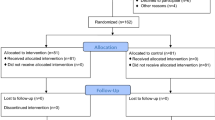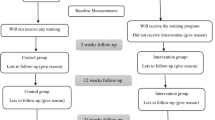Abstract
Purpose
Lack of knowledge about computer ergonomics predisposes users to musculoskeletal and visual disorders. The present study examined the effect of a trans-theoretical model (TTM)-based educational program on work-related posture in office computer users.
Methods
This experimental study examined 102 hospital personnel whose primary job involved working at a computer. Participants were randomized to intervention and control groups. An educational intervention based on TTM was conducted over five sessions. A self-report questionnaire was used to collect data including stages of change, processes of change, pros and cons of change, and self-efficacy. A pen–paper-based observational method (i.e., Rapid Office Strain Assessment or ROSA) was used for assessing work posture. A visual analogue scale assessed pain intensity. Data were collected at baseline and 3-month follow-up.
Results
Significant differences were found on TTM’s constructs and ROSA score between intervention and control groups at follow-up (p < 0.05). The mean ROSA score decreased from 5.65 (SD 1.03) to 3.95 (SD 0.83) in the intervention group, while no significant change was found in the control group. Pain intensity also decreased significantly among those in the intervention vs. control group (p < 0.001).
Conclusion
An educational intervention based on TTM was effective in improving ergonomic posture in computer workers. Further research is needed to determine if these results can be generalized to computer workers in other settings.

Similar content being viewed by others
References
Albin TJ (2015) Computer ergonomics: the state of the art. Work 52:215–216. https://doi.org/10.3233/WOR-152169
Ayanniyi O, Ukpai BO, Adeniyi AF (2010) Differences in prevalence of self-reported musculoskeletal symptoms among computer and non-computer users in a Nigerian population: a cross-sectional study. BMC Musculoskel Disord 11:177. https://doi.org/10.1186/1471-2474-11-177
Baydur H, Ergor A, Demiral Y, Akalin E (2016) Effects of participatory ergonomic intervention on the development of upper extremity musculoskeletal disorders and disability in office employees using a computer. J Occup Health 58:297–309. https://doi.org/10.1539/joh.16-0003
Blagojevic L, Petrovic B, Blagojevic J (2012) Risk factors for health disorders in computer operators in telecom. Serbia Int J Occup Safety Ergon JOSE 18:321–327. https://doi.org/10.1080/10803548.2012.11076935
Brink Y, Louw Q, Grimmer K, Jordaan E (2015) The relationship between sitting posture and seated-related upper quadrant musculoskeletal pain in computing South African adolescents: a prospective study. Man Therapy 20:820–826. https://doi.org/10.1016/j.math.2015.03.015
Bruno Garza JL, Young JG (2015) A literature review of the effects of computer input device design on biomechanical loading and musculoskeletal outcomes during computer work. Work 52:217–230. https://doi.org/10.3233/WOR-152161
Carvalho de Menezes M, Bedeschi LB, Santos LC, Lopes AC (2016) Interventions directed at eating habits and physical activity using the transtheoretical model: a systematic review. Nutr Hosp 33:586. https://doi.org/10.20960/nh.586
Cassidy CA (1997) Facilitating behavior change. Use of the transtheoretical model in the occupational health setting. AAOHN J 45:239–246
Chaiklieng K (2015) Health risk assessment and incidence of shoulder pain among office workers. Procedia Manufac 3:4941–4947. https://doi.org/10.1016/j.promfg.2015.07.636
Cheng HK, Wong MT, Yu YC, Ju YY (2016) Work-related musculoskeletal disorders and ergonomic risk factors in special education teachers and teacher’s aides. BMC Pub Health 16:137. https://doi.org/10.1186/s12889-016-2777-7
Davis KG, Kotowski SE (2014) Postural variability: an effective way to reduce musculoskeletal discomfort in office work. Hum Factors 56:1249–1261
Esmaeilzadeh S, Ozcan E, Capan N (2014) Effects of ergonomic intervention on work-related upper extremity musculoskeletal disorders among computer workers: a randomized controlled trial. Int Arch Occup Environ Health 87:73–83. https://doi.org/10.1007/s00420-012-0838-5
Fotiadis DG, Fotiadou EG, Kokaridas DG, Mylonas AC (2013) Prevalence of musculoskeletal disorders in professional symphony orchestra musicians in Greece: a pilot study concerning age, gender, and instrument-specific results. Med Prob Perform Artists 28:91–95
Glanz K, Rimer BK, Viswanath K (2008) Health behavior and health education: theory, research, and practice, 4th edn. Jossey-Bass, San Francisco
Global Recommendations on Physical Activity for Health (2011) World Health Organization. http://www.who.int/dietphysicalactivity/physical-activity-recommendations-18-64years.pdf. Accessed 25 Nov 2017
Griffiths KL, Mackey MG, Adamson BJ (2011) Behavioral and psychophysiological responses to job demands and association with musculoskeletal symptoms in computer work. J Occup Rehabil 21:482–492. https://doi.org/10.1007/s10926-010-9263-3
Hulley SB (2001) Designing clinical research: an epidemiologic approach, 2nd edn. Lippincott Williams & Wilkins, Philadelphia
Hutchison AJ, Breckon JD, Johnston LH (2009) Physical activity behavior change interventions based on the transtheoretical model: a systematic review. Health Educ Behav 36:829–845. https://doi.org/10.1177/1090198108318491
Jamjumrus N, Nanthavanij S (2008) Ergonomic intervention for improving work postures during notebook computer operation. J Hum Ergol 37:23–33
Janis IL, Mann L (1977) Decision making: a psychological analysis of conflict, choice, and commitment. Free Press, New York
Jaromi M, Nemeth A, Kranicz J, Laczko T, Betlehem J (2012) Treatment and ergonomics training of work-related lower back pain and body posture problems for nurses. J Clin Nurs 21:1776–1784. https://doi.org/10.1111/j.1365-2702.2012.04089.x
Levanon Y, Gefen A, Lerman Y, Givon U, Ratzon NZ (2012) Reducing musculoskeletal disorders among computer operators: comparison between ergonomics interventions at the workplace. Ergonomics 55:1571–1585. https://doi.org/10.1080/00140139.2012.726654
Liebregts J, Sonne M, Potvin JR (2016) Photograph-based ergonomic evaluations using the Rapid Office Strain Assessment (ROSA). Appl Ergon 52:317–324. https://doi.org/10.1016/j.apergo.2015.07.028
Loghmani A, Golshiri P, Zamani A, Kheirmand M, Jafari N (2013) Musculoskeletal symptoms and job satisfaction among office-workers: a cross-sectional study from Iran. Acta Med Acad 42:46–54. https://doi.org/10.5644/ama2006-124.70
Mani K, Provident I, Eckel E (2016) Evidence-based ergonomics education: promoting risk factor awareness among office computer work. Work 55:913–922. https://doi.org/10.3233/WOR-162457
Moazzami Z, Dehdari T, Taghdisi MH, Soltanian A (2015) Effect of an ergonomics-based educational intervention based on transtheoretical model in adopting correct body posture among operating room nurses global. J Health Sci 8:26–34. https://doi.org/10.5539/gjhs.v8n7p26
Mohammadi Zeidi I, Morshedi H, Mohammadi Zeidi B (2011) The effect of interventions based on transtheoretical modelling on computer operators’. Postural Habits Clin Chiropractic 14:17–28. https://doi.org/10.1016/j.clch.2010.07.001
Ozcan E, Esmaeilzadeh S, Basat H (2011) Upper extremity work-related musculoskeletal disorders among computer users and effectiveness of ergonomic interventions Turk Fiz. Tip Rehab D 57:236–241. https://doi.org/10.4274/tftr.49091
Parsons S, Breen A, Foster NE, Letley L, Pincus T, Vogel S, Underwood M (2007) Prevalence and comparative troublesomeness by age of musculoskeletal pain in different body locations. Family Pract 24:308–316. https://doi.org/10.1093/fampra/cmm027
Pillastrini P et al (2010) Effectiveness of an ergonomic intervention on work-related posture and low back pain in video display terminal operators: a 3 year cross-over trial. Appl Ergon 41:436–443. https://doi.org/10.1016/j.apergo.2009.09.008
Piranveyseh P, Motamedzade M, Osatuke K, Mohammadfam I, Moghimbeigi A, Soltanzadeh A, Mohammadi H (2016) Association between psychosocial, organizational and personal factors and prevalence of musculoskeletal disorders in office workers. Int J Occup Safety Ergon 22:267–273. https://doi.org/10.1080/10803548.2015.1135568
Prochaska JO, DiClemente CC (1994) The transtheoretical approach: crossing traditional boundaries of therapy. Krieger Pub., Malabar
Rasoulzadeh Y, Gholamnia R (2012) Effectiveness of an ergonomics training program on decreasing work-related musculoskeletal disorders risk among video display. Term Users Health Promot Perspect 2:89–95. https://doi.org/10.5681/hpp.2012.011
Salvendy G (2012) Handbook of human factors and ergonomics, 4th edn. Wiley, Hoboken
Sanaeinasab H, Saffari M, Nazeri M, Karimi Zarchi A, Cardinal BJ (2013) Descriptive analysis of Iranian adolescents’ stages of change for physical activity behavior. Nurs Health Sci 15:280–285. https://doi.org/10.1111/nhs.12020
Sharma M, Romas JA (2012) Theoretical foundations of health education and health promotion, 2nd edn. Jones & Bartlett Learning, Sudbury
Sherrod C, Johnson D, Chester B (2014) Safety, tolerability and effectiveness of an ergonomic intervention with chiropractic care for knowledge workers with upper-extremity musculoskeletal disorders: a prospective case series. Work 49:641–651. https://doi.org/10.3233/WOR-131732
Skaal L, Pengpid S (2012) The predictive validity and effects of using the transtheoretical model to increase the physical activity of healthcare workers in a public hospital in South Africa. Transl Behav Med 2:384–391. https://doi.org/10.1007/s13142-012-0136-5
Sonne M, Villalta DL, Andrews DM (2012) Development and evaluation of an office ergonomic risk checklist: ROSA—rapid office strain assessment. Appl Ergon 43:98–108. https://doi.org/10.1016/j.apergo.2011.03.008
Tavafian SS, Zeidi IIM, Heidarnia AR (2012) Theory-based education and postural ergonomic behaviours of computer operators: a randomized controlled trial from Iran Turk Fiz. Tip Rehab D 58:312–318. https://doi.org/10.4274/tftr.29863
Tuomivaara S, Ketola R, Huuhtanen P, Toivonen R (2008) Perceived competence in computer use as a moderator of musculoskeletal strain in VDU work: an ergonomics intervention case. Ergonomics 51:125–139. https://doi.org/10.1080/00140130701561850
Woo EH, White P, Lai CW (2016) Ergonomics standards and guidelines for computer workstation design and the impact on users’ health—a review. Ergonomics 59:464–475. https://doi.org/10.1080/00140139.2015.1076528
Acknowledgements
The authors would like to thank the authorities of research deputy in Baqiyatallah Hospital who granted us permission to conduct this study.
Funding
None.
Author information
Authors and Affiliations
Corresponding author
Ethics declarations
Conflict of interest
The authors declare that they have no conflict of interest.
Ethical approval
The Baqiyatallah University of Medical Sciences’ ethical committee approved this study. All procedures performed in studies involving human participants were in accordance with the ethical standards of the institutional and/or national research committee and with the 1964 Helsinki declaration and its later amendments or comparable ethical standards. This article does not contain any studies with animals performed by any of the authors.
Rights and permissions
About this article
Cite this article
Sanaeinasab, H., Saffari, M., Valipour, F. et al. The effectiveness of a model-based health education intervention to improve ergonomic posture in office computer workers: a randomized controlled trial. Int Arch Occup Environ Health 91, 951–962 (2018). https://doi.org/10.1007/s00420-018-1336-1
Received:
Accepted:
Published:
Issue Date:
DOI: https://doi.org/10.1007/s00420-018-1336-1




